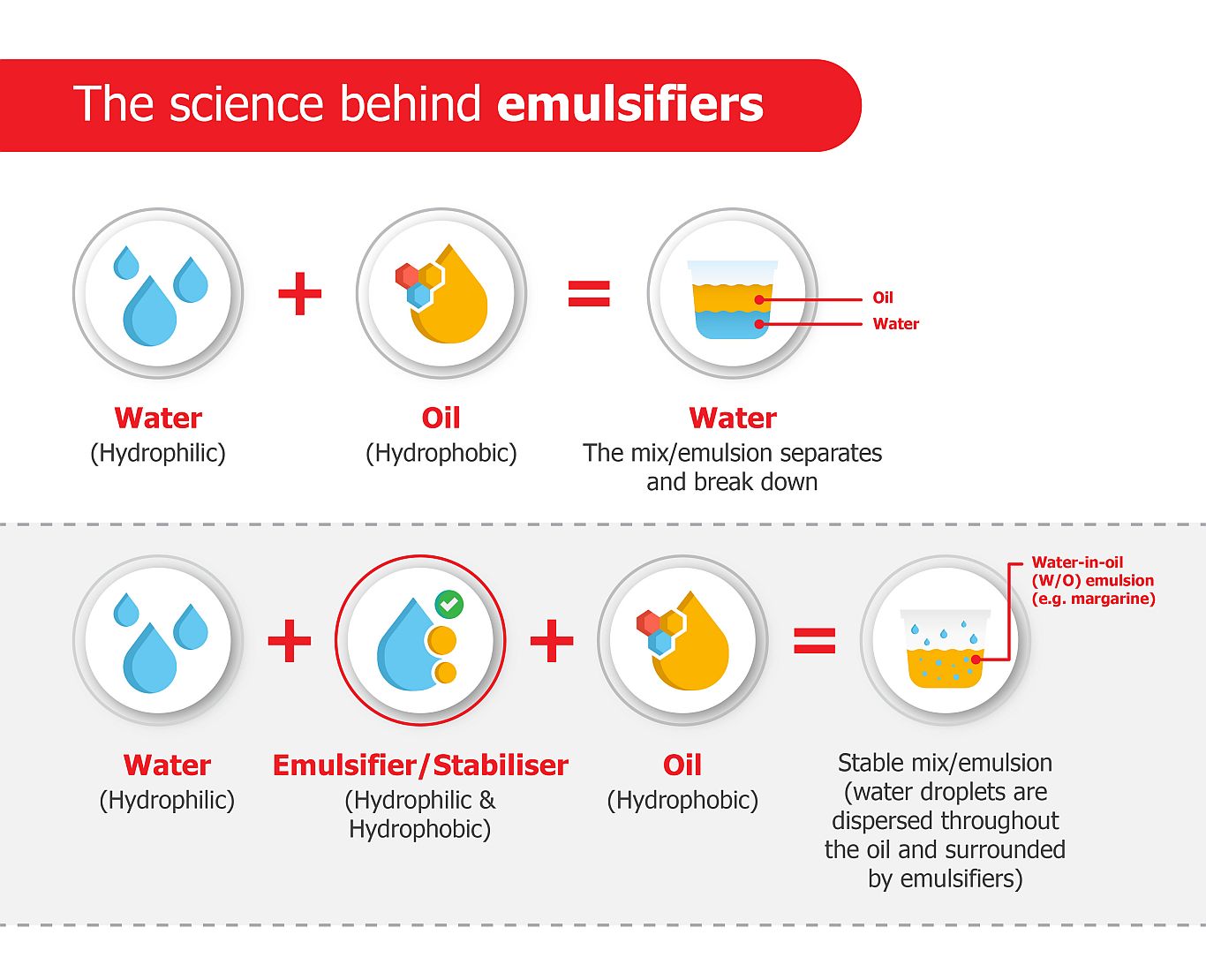Find out Just How an Emulsifier in Food Can Assist Achieve Flawlessly Blended Dishes Every Single Time
Emulsifiers are essential active ingredients in the culinary world, enabling the mixing of oil and water-based elements. Their capability to lower surface area tension enables the creation of secure mixtures, enhancing both structure and taste in numerous dishes. Recognizing how these substances function can change the method one comes close to food preparation. Yet, several stay not aware of the different kinds of emulsifiers and their details applications. Discovering this subject discloses important insights for accomplishing cooking perfection.
What Are Emulsifiers and How Do They Work?
Emulsifiers play a vital role in the food market by making it possible for the stable mixing of components that generally do not combine, such as oil and water. These compounds possess both hydrophilic (water-attracting) and hydrophobic (water-repelling) homes, enabling them to interact with both kinds of components. When an emulsifier is added to a mix, it lowers the surface stress in between the oil and water, assisting in the development of little droplets of one liquid dispersed within the other. This process creates a secure solution, preventing separation gradually and improving appearance and mouthfeel. Emulsifiers are fundamental in various food items, from salad dressings to ice lotions, ensuring consistency and high quality. They also contribute to the overall sensory experience of food, affecting taste launch and aesthetic charm. Comprehending exactly how emulsifiers operate is crucial for food scientists and chefs alike, as they endeavor to develop enjoyable and balanced culinary experiences.
Common Kinds Of Emulsifiers Utilized in Cooking
Countless sorts of emulsifiers are used in food preparation to accomplish desired textures and security in various food items. Typical emulsifiers include lecithin, which is normally discovered in egg yolks and soybeans, and is widely utilized in mayonnaise and dressings. An additional common emulsifier is mustard, which has compounds that aid blend oil and water in sauces.
Additionally, industrial emulsifiers such as mono- and diglycerides are typically included in refined foods to enhance their security and improve service life. Starch-based emulsifiers, originated from corn or potatoes, are likewise employed in sauces and puddings for enlarging and texture. Casein, a milk healthy protein, serves as an emulsifying representative in dairy items like cheese and cream. Each of these emulsifiers plays a vital duty in making certain that ingredients blend effortlessly, offering the wanted uniformity and flavor in culinary developments.
The Science Behind Emulsification

The security of a solution counts navigate here on the balance in between the forces acting upon the spread beads. If the droplets coalesce, the solution can damage, bring about splitting up. Numerous factors, such as temperature level, focus of the emulsifier, and the technique of blending, influence the success of emulsification. Understanding this clinical structure is vital for accomplishing consistent results in culinary applications involving solutions.
Tips for Making Use Of Emulsifiers in Your Recipes
When integrating emulsifiers into dishes, cautious consideration of their homes and performance can greatly improve the final product. Initially, one must choose the ideal emulsifier based on the desired appearance and security of the meal. Emulsifier In Food. Typical options include lecithin, mustard, and egg yolks, each offering one-of-a-kind benefits
It's necessary to comprehend the temperature level at which the emulsifier functions finest; for instance, some emulsifiers work properly at room temperature, while others call for heat. Slowly including oil to the emulsifier while whisking can assist develop a secure emulsion.
Additionally, the proportion of emulsifier to fluid is important; inadequate might cause separation, while excessive can develop an undesirable appearance. Correct storage conditions should be thought about, as some emulsified products might require refrigeration to keep stability and quality. By following these tips, cooks can achieve regularly well-blended recipes.

Delicious Recipes Featuring Emulsifiers
While several cooks may not recognize it, including emulsifiers right into recipes can boost meals to new elevations of flavor and appearance. As an example, a classic vinaigrette benefits significantly from the addition of mustard, which functions as an emulsifier, giving a smooth uniformity that binds oil and vinegar flawlessly. Similarly, homemade mayo showcases the power of egg yolks, developing a luscious, elegant sauce excellent for sandwiches and salads.
In cooking, emulsifiers like lecithin can assist achieve a tender crumb in muffins and cakes, improving dampness retention. An abundant chocolate ganache, made with heavy lotion and chocolate, can additionally incorporate an emulsifier to preserve a silky surface. Furthermore, ice go to my site lotions commonly use emulsifiers to stop and assure a creamy structure ice crystal development, resulting in a wonderful dessert experience. By incorporating these emulsifying agents, cooks can develop dishes that delight the taste and provide a gratifying mouthfeel.
Often Asked Questions
Are Emulsifiers Safe for People With Food Allergies?
Emulsifiers can be risk-free for individuals with food allergic reactions, relying on the specific emulsifier used. Nevertheless, cross-reactivity and private level of sensitivities vary; as a result, getting in touch with a medical care professional is recommended to ensure security.
Can I Make My Own Emulsifier at Home?
Yes, individuals can create homemade emulsifiers using ingredients like egg yolks, mustard, or honey. These all-natural options can effectively mix oils and water-based elements, supplying a basic option for various culinary applications.
Just How Do Emulsifiers Affect the Nutritional Value of Food?
Emulsifiers can boost the dietary value of food by improving nutrient absorption and security. Nevertheless, too much usage may bring about adverse results, potentially modifying digestion processes and impacting intestine wellness in delicate individuals.


Are There Any Type Of Unfavorable Negative Effects of Consuming Emulsifiers?
Some studies suggest that taking in emulsifiers might bring about stomach concerns or disrupt intestine microbiota equilibrium. Nevertheless, further study is necessary to completely recognize their long-term impacts on health and prospective unfavorable adverse effects.
Can Emulsifiers Change the Taste of My Dishes?
Emulsifiers can discreetly change the flavor profile of recipes. By enhancing texture and mouthfeel, they might make tastes a lot more noticable or well his explanation balanced, however they typically do not impart solid tastes by themselves.
Emulsifiers play an important duty in the food industry by enabling the stable mixing of components that typically do not combine, such as oil and water. Various types of emulsifiers are used in food preparation to achieve preferred structures and stability in various food products. Additionally, commercial emulsifiers such as mono- and diglycerides are commonly added to refined foods to boost their security and boost rack life. It's essential to understand the temperature level at which the emulsifier operates ideal; for circumstances, some emulsifiers work properly at room temperature level, while others need warm (Emulsifier In Food). Emulsifiers can be safe for individuals with food allergic reactions, depending on the specific emulsifier used